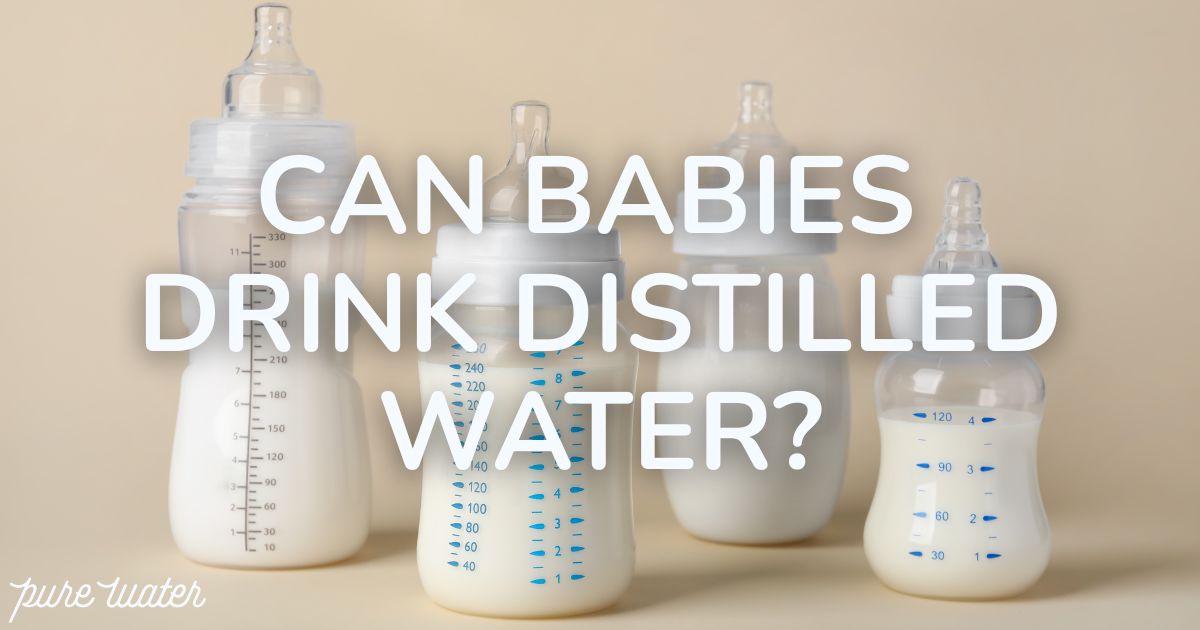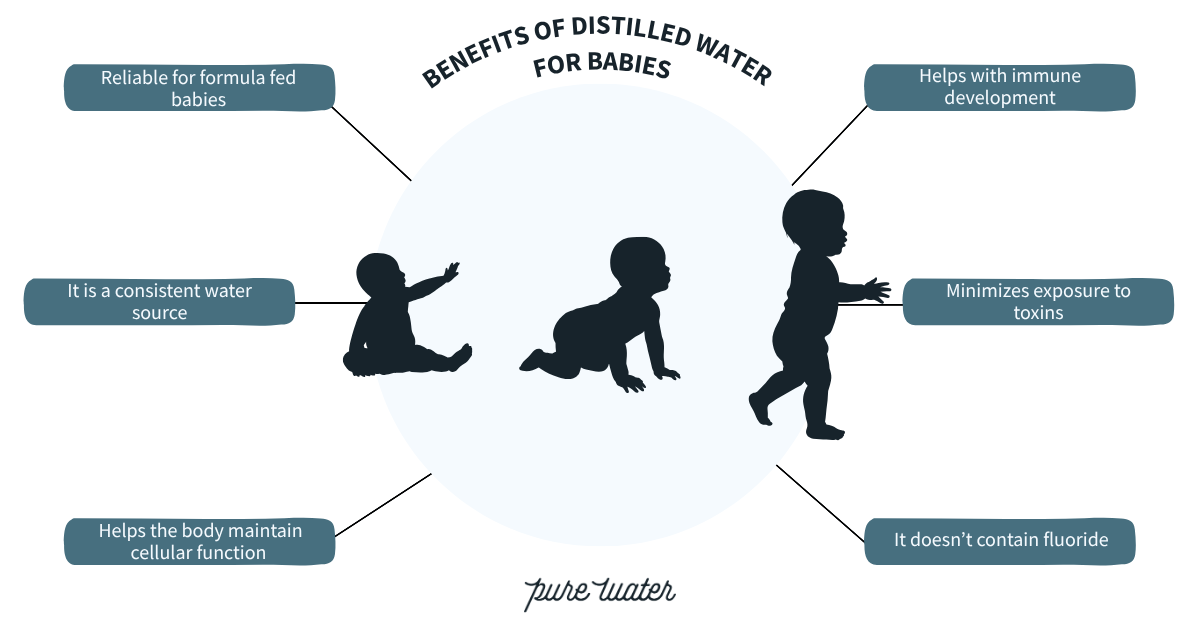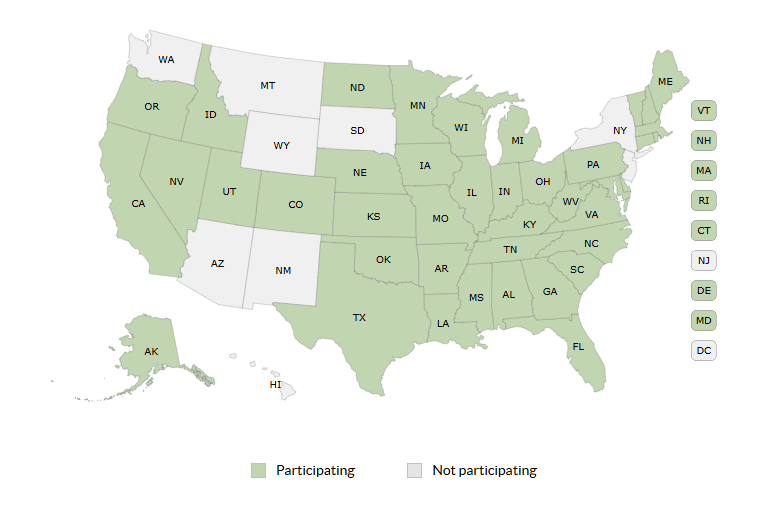Can Babies Drink Distilled Water?
Long story short, yes! Babies can and should drink distilled water, and it’s recommended by doctors and formula manufacturers.
Distilled water goes through a natural purification process similar to the Earth’s own hydrologic cycle. A Pure Water distiller boils water, turning it into steam—just like the sun heats lakes and oceans to create evaporation. That steam is then cooled and condensed, forming pure water droplets, much like clouds turning into rain. The result is clean, contaminant-free water collected in a glass jar or stainless steel tank.
Because distilled water is 99.9% pure, it contains no harmful bacteria, chemicals, or heavy metals that can be found in tap water. The distillation process makes pure water an excellent choice for hydrating babies once they’re ready to consume water.
When should you use Distilled Water:
For Mixing Formula
As parents, we carefully choose the best formula, bottles, and feeding routines to give our little ones a healthy start. But one thing that often gets overlooked is the water used to prepare that formula. The quality of the water matters just as much as the formula itself — and that’s where distilled water stands out as a wise, reliable choice.
A debate arises when it comes to mixing formula, specifically whether to use distilled water or purified water. Purified water is considered a “safe” alternative for mixing baby formula, but it can still contain minerals and impurities that can be harmful to the baby’s body. It is believed that using purified water in baby formula can interfere with the formula’s nutrient balance.
Pediatricians often recommend distilled water for infants, older people, and those with weaker immune systems, as it reduces exposure to toxins and helps avoid placing extra stress on developing or sensitive bodies. By choosing distilled water, parents can feel confident that their baby’s water is as pure and safe as possible.
For babies, whose immune systems are still developing, the level of purity that distilled water provides is especially important. Using distilled water to mix the formula minimizes their exposure to toxins and chemicals. This gives their little bodies the cleanest start possible. Babies are more susceptible to infection in the first six months of life. Their immune systems are immature, and during this time, they start to ramp up by developing their own responses to viruses and bacteria.
Distilled water is actually the safest option for preparing baby formula because:
- It’s free from contaminants, including bacteria, lead, nitrates, and chlorine.
- It doesn’t contain fluoride, which can help prevent fluorosis (white spots on teeth) in infants under 6 months.
- It provides a consistent, controlled water source, unlike tap water, which can vary in quality.
Consistency
Another benefit of choosing distilled water for babies is consistency. Unlike tap water, which can vary in quality depending on location, plumbing, or seasonal changes, distilled water delivers the same purity level every time. That means parents can mix formula to know exactly what’s in their baby’s bottle, hydrate their children with pure water, and feel confident about their developing children’s bodies.
Many pediatricians recommend distilled water for newborns, infants, and children with sensitive systems because it’s gentle, reliable, and easy to use. By choosing distilled water, you’re not just choosing a beverage for your baby — you’re creating a safe, toxin-free foundation to support your baby’s growth and well-being.
Immune Support
By age three, much of a child’s immune system has developed, though it continues to mature throughout childhood. This period is also when food sensitivities, allergies, or eczema often become noticeable. Genetics, environment, and nutrition all influence immune development.
Healthy immune responses depend on well-hydrated cells. Using pure, contaminant-free water — such as distilled water — helps the body stay hydrated, supporting nutrient transport, waste removal, and overall cellular function. Ensuring proper hydration is especially important during the rapid growth period from birth to age three.
Common misconceptions about distilled water:
Do babies need fluoride for tooth development?
Babies do not yet have teeth and get their nutrition from the milk that they consume. Distillation doesn’t contain fluoride, so it is safe for formula preparation.
Fluoride wasn’t considered a problem until the early 20th century, when scientists began to realize that it could damage teeth. In the 1930s, studies showed that children living in areas with water containing extremely high levels of fluoride (26 times higher than average) had brown stains on their teeth. This condition, known as dental fluorosis, is still prevalent today in communities with high levels of fluoride in their water.
Fluoride has recently undergone scrutiny by Congress because of new scientific evidence showing fluoride is ineffective and poses serious health risks. It has been effectively banned in all 27 countries in the EU, as well as Japan, China, India, and Israel.
The National Toxicology Program released a in August 2024 concluding with “moderate confidence” that fluoride exposure above 1.5 milligrams per liter is associated with lower IQ in children. There is now more investigation going on to assess the safety of fluoride in drinking water. Distilled water contains no fluoride, helping parents avoid overexposure in young infants and reducing the risk of dental fluorosis during those early months. If you are concerned about the level of fluoride in your drinking water, you can check the map below or click to view more info.
Do babies need the minerals that tap water provides?
No.
While many people believe this, the truth is quite different. To fully understand distilled water and minerals, it is helpful first to know what minerals are, how we obtain them, and how our bodies absorb both water and minerals.
Minerals are chemical elements that are essential nutrients to living organisms to perform critical functions necessary for life. Minerals in our bodies are responsible for performing basic functions. For example, calcium helps build bone, activate enzymes, and regulate blood pressure. Potassium helps balance fluid in the body, maintain a steady heartbeat, and make muscles contract.
It’s easy to see why minerals are so crucial for our bodies, but how do we actually get them? Most minerals come from the foods we eat, such as plants and animals. A minimal amount of our mineral intake comes from the water we drink. While there are plenty of sources, not all minerals are absorbed equally. Factors such as age, medications, alcohol use, certain health conditions, stress, and most importantly, bioavailability can all affect how well your body can use the minerals you consume.
Bioavailability refers to how easily a mineral can be absorbed and used by the body. Minerals become bioavailable when they are processed by plants and animals that consume those plants. Minerals that haven’t been processed aren’t easily absorbed — unless they are present in high concentrations and dissolved in water. That’s why simply eating dirt won’t give your body the minerals it needs! Many minerals in tap water are bioavailable, but their contribution to total nutrition is usually very small. Meaning you cannot drink the tap water and benefit from the minerals within it. The USDA has stated that only 1% of your daily mineral intake can come from your water consumption.
Babies do not need minerals from tap water because they are not bioavailable and can potentially cause harmful effects. Instead, babies receive their nutrients and minerals from the milk they consume and the solid foods in their diets.
Conclusion
Yes, babies can drink distilled water — and it’s the preferred choice for mixing formula due to its purity. Before 6 months, babies get all the hydration they need from breast milk or formula. After 6 months, small amounts of distilled water can be safely offered as they start eating solids. Pure, contaminant-free water helps keep babies hydrated and supports their growing bodies.
Want to make the switch to distilled water for your family and little ones? Shop our pure water distillers now, and get ready for the purest water on earth!






Leave a Reply